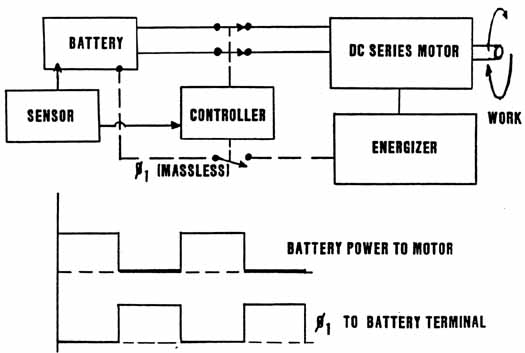|
On this slide, we
show a theoretical scheme which several researchers have discovered and used to
build simple free energy motors.
In this scheme, we drive
an ordinary d.c. series motor by a two wire system from an ordinary
battery. The motor produces shaft horsepower, at -- say -- some 30 or 40 percent
efficiency, compared to the power drained from the battery. This much of the circuit is perfectly ordinary.
The trick here is to get the battery to recharge itself, without furnishing normal power to it, or expending work
from the external circuit in the process.
To do this, recall that a charged particle in a "hooking" del-phi river moves itself.
This is true for an ion, as well as for an electron. We need only make the del-phi in correct
fashion and synchronize it; specifically, we must not release the hose nozzles we utilize to produce our del-phi
river or waves.
The inventors who have discovered this have used various variations, but here we
show a common one.
First, we add an "energizer" (often referred to by various other names) to the circuit. This device
makes the del-phi waves we will utilize, but does NOT make currents of electron masses.
In other words, it makes pure Ø-dot. It takes a little work to
do this, for the energizer circuit must pump a few charges now and then. So the energizer draws a little bit of power from the motor, but not very much.
Now we add a switching device, called a controller, which breaks up power to the motor in pulses.
During one pulse, the battery is connected and furnishes power to the motor; during the succeeding pulse, the battery is disconnected completely from the motor and the output from the
energizer is applied across the terminals of the battery.
If frequency content, spin-hole content, etc.
are properly constructed by the energizer, then the ion movements in the battery
reverse themselves, recharging the battery. Again, remember that these
ions MOVE THEMSELVES during this recharge phase. Specifically, we are NOT furnishing ordinary current to the battery, and we are not doing
work on it from the energizer.
If things
are built properly, the battery can be made to more than recover its charge
during this pulse cycle.
To prevent excess charge of the battery and overheating and destroying it, a
sensor is added which senses the state of charge of the battery, and furnishes a feedback signal to the controller to regulate the length of recharge time per "power off" pulse.
In other words, the system is now self-regulating.
The relation between
power pulses and recharge pulses is shown on the graphs at the bottom.
Note that regulation may decrease the time of recharge application of the del-phi river.
This system, if
properly built and tuned, will furnish "free shaft energy" continually, without violating
conservation of anenergy. Remember that the del-phi condition across the battery terminals means that
spacetime is suddenly curved there, and conservation of energy need no longer apply.
Again, this system is
consistent with general relativity and with the fact that Ø-field alone can drive a
situation relativistic. We have deliberately used these facts to do direct engineering.
Our "extra energy" comes from shifting phi-flux -- the energy of
the universal vacuum spacetime -- directly into ordinary energy for our use.
Thus we draw on an inexhaustible source, and our device is no more esoteric than a paddlewheel in
a river. The only difference is that, in this case, we have to be clever enough to make and divert the river in the right timing
sequency.
This is a free energy device which an ordinary person, who
knows a little electronics, can experiment with in the basement. To
develop it, one is talking several thousands of dollars and a lot of
persistence and tinkering; one is not talking millions.
WARNING: THE
PRECEDING EXPERIMENTS ARE HAZARDOUS. DO NOT ATTEMPT THESE EXPERIMENTS
UNDER ANY CIRCUMSTANCES UNLESS YOU ARE AN EXPERIENCED ELECTRICAL RESEARCHER,
EXPERIENCED IN PERFORMING EXPERIMENTS WITH LEAD-ACID BATTERIES AND PULSE CHARGE
AND DISCHARGE OF SAME, AND UNLESS YOU ALSO USE ALL SAFETY PRECAUTIONS SUCH AS
GOGGLES AND PROTECTIVE GLOVES, SLEEVES, AND APRON. YOU MUST NOT HAVE OTHER
INFLAMMABLE LIQUIDS OR OTHER SUBSTANCES PRESENT WHICH COULD BE IGNITED AND BURN
OR EXPLODE. SURGED LEAD-ACID BATTERIES PRODUCE HYDROGEN GAS, WHICH CAN
EASILY EXPLODE SINCE SPARKING ALSO CAN OCCUR. THE ACID FROM SUCH AN EXPLOSION
CAN EASILY BLIND YOU IF IT GETS IN YOUR EYES, AND IT CAN BURN YOUR SKIN.
IN ADDITION, LEAD AND LEAD COMPOUNDS ARE POISONS, AND ARE TO BE HANDLED ONLY BY
EXPERIENCED RESEARCHERS. THESE EXPERIMENTS ARE NOT FOR AMATEURS UNDER ANY
CIRCUMSTANCE, BUT ONLY FOR EXPERIENCED PROFESSIONALS WITH PROPER KNOWLEDGE AND
TRAINING, AND USING PROPER PRECAUTIONS. NEITHER THE AUTHOR NOR THE
PUBLISHER IS REPONSIBLE OR LIABLE FOR ANY ACCIDENTS OR DAMAGE YOU MAY ENCOUNTER,
AND ALL EXPERIMENTATION WITH THESE DEVICES AND PROCEDURES IS AT YOUR OWN ASSUMED
PERSONAL RISK.
Next Slide
|

